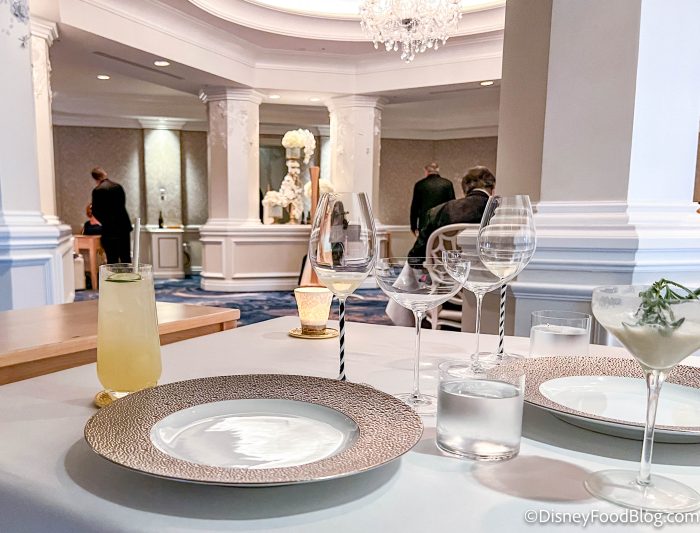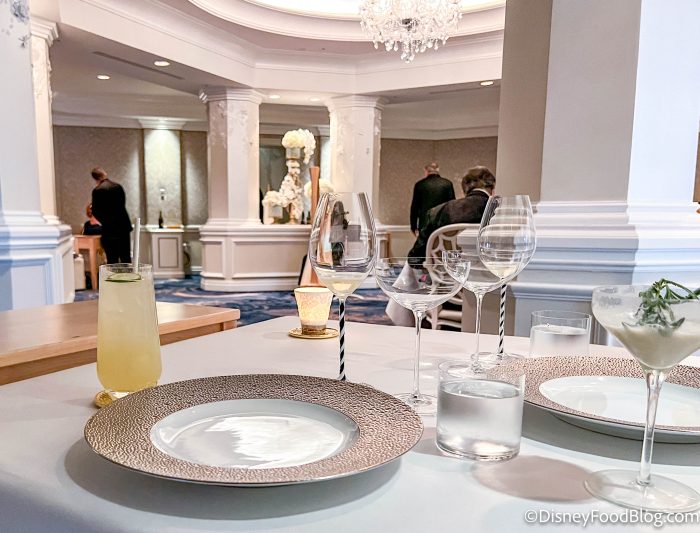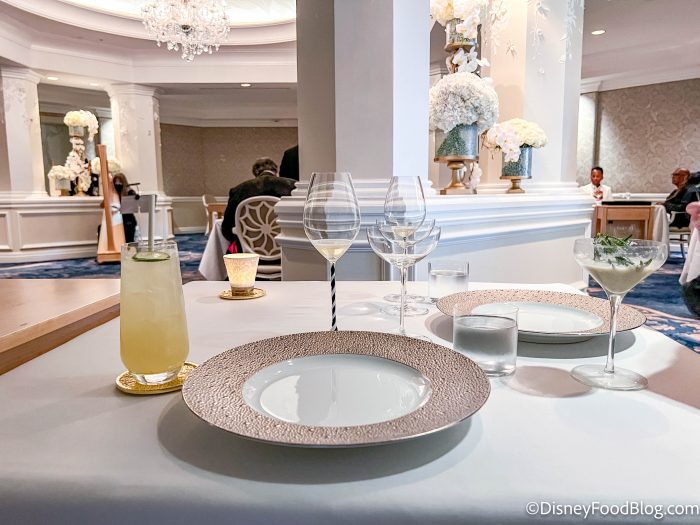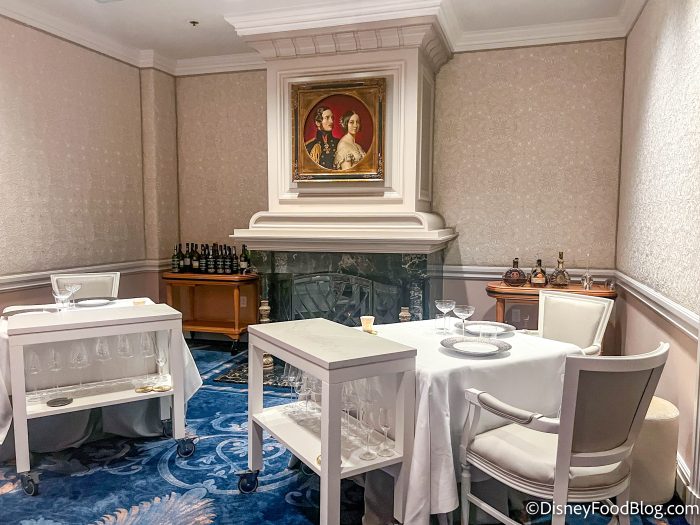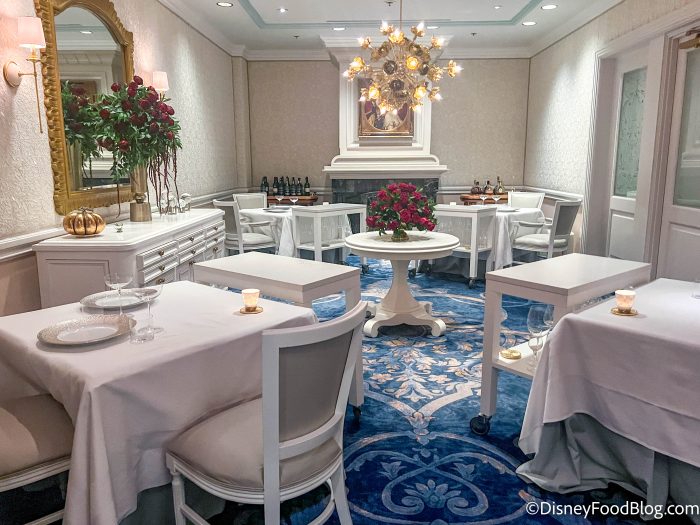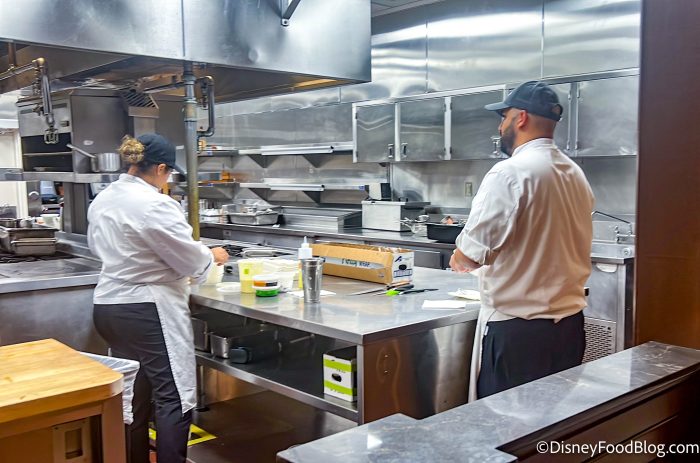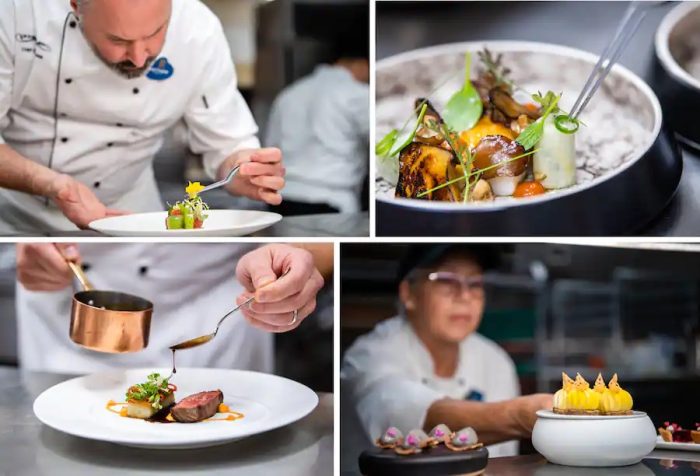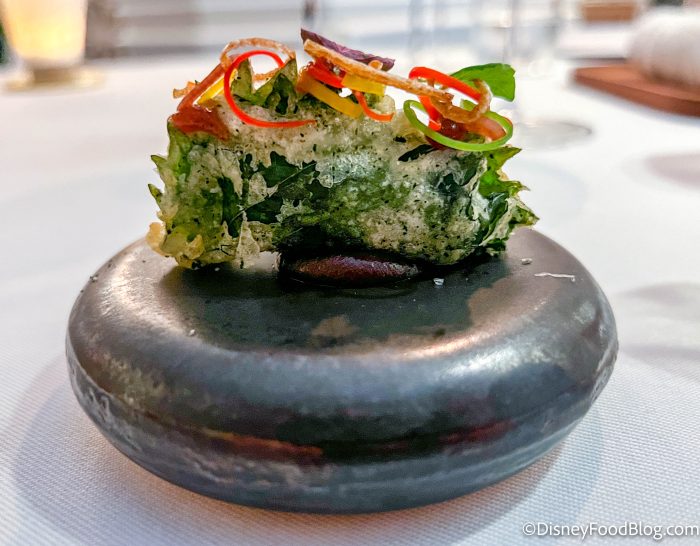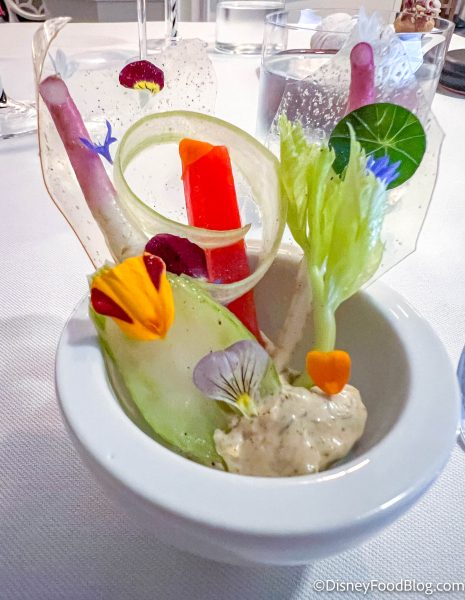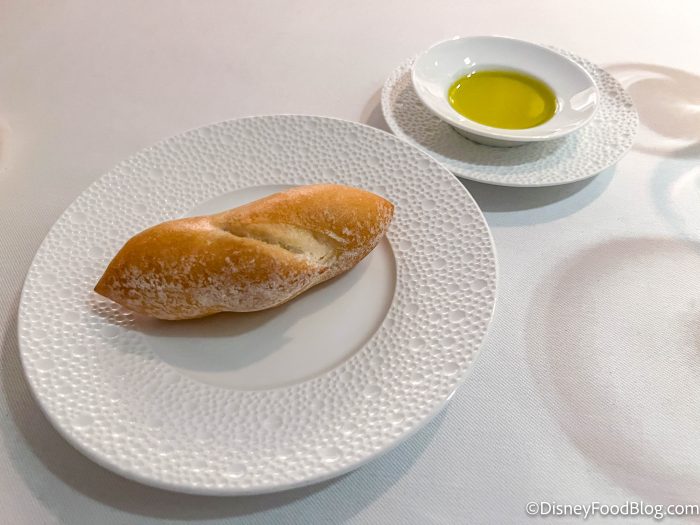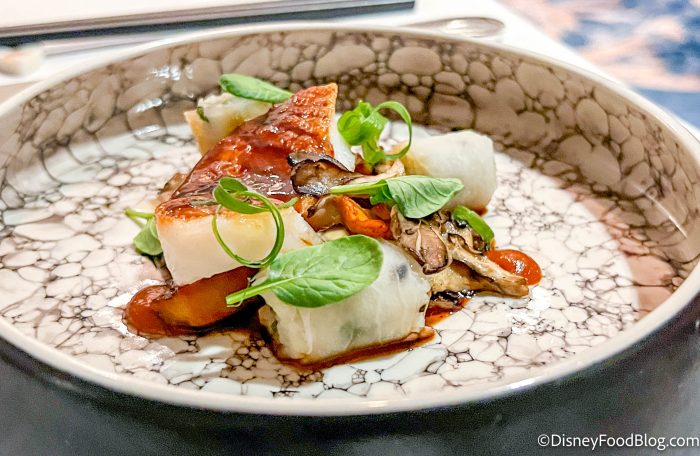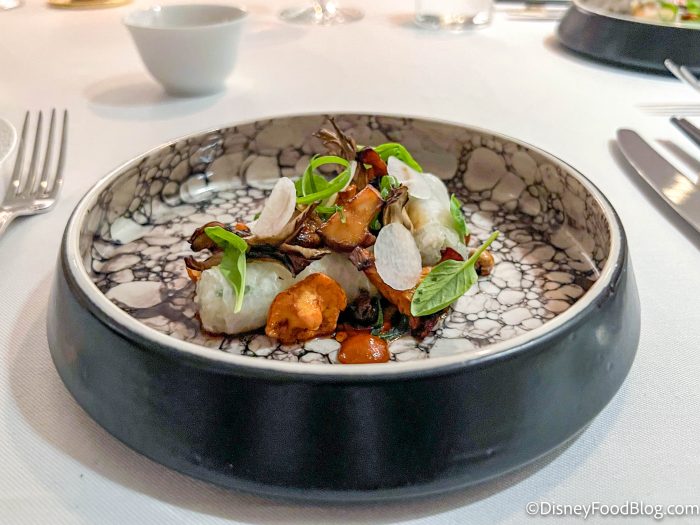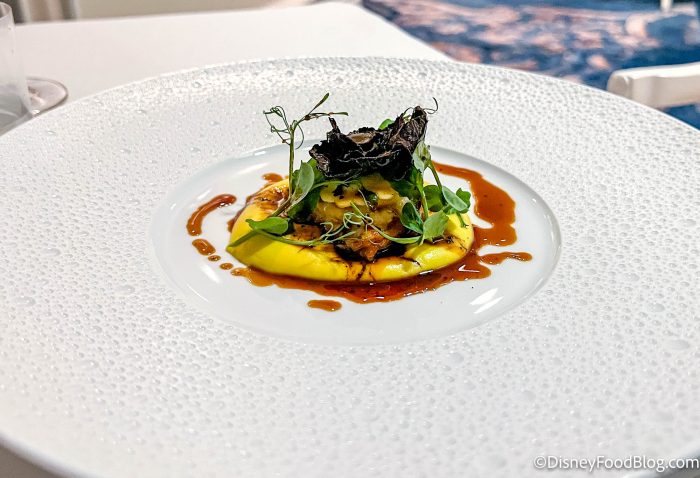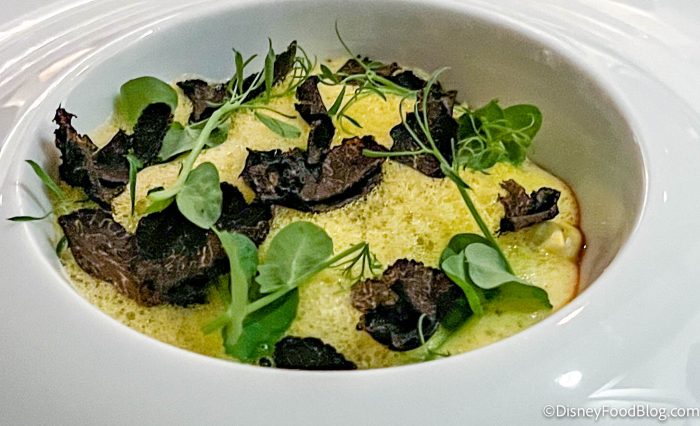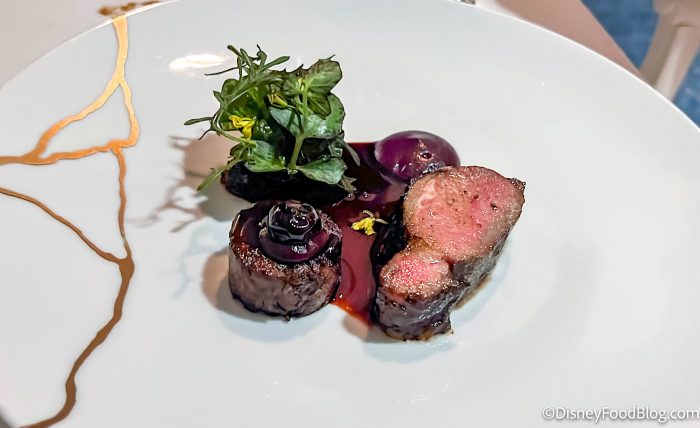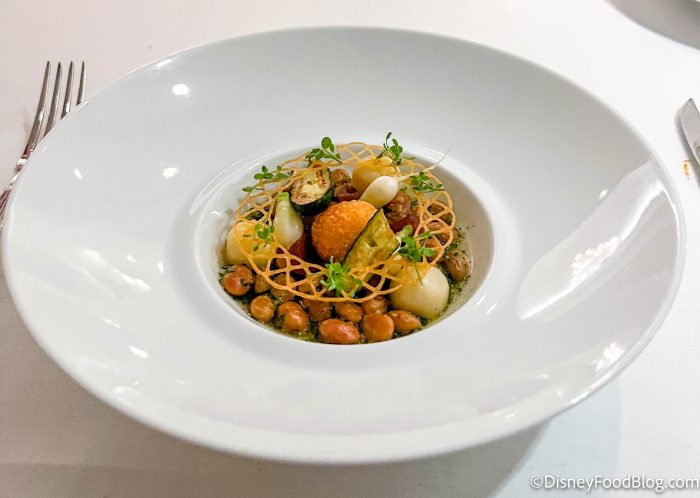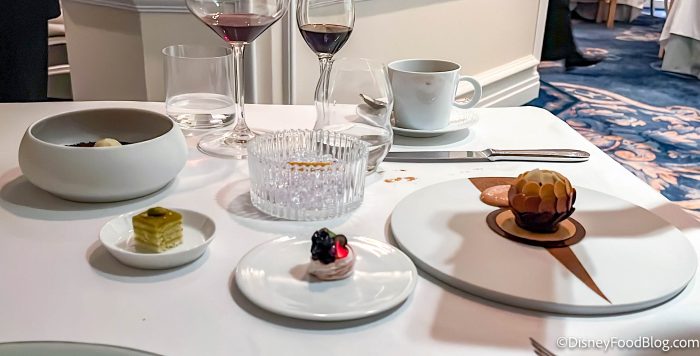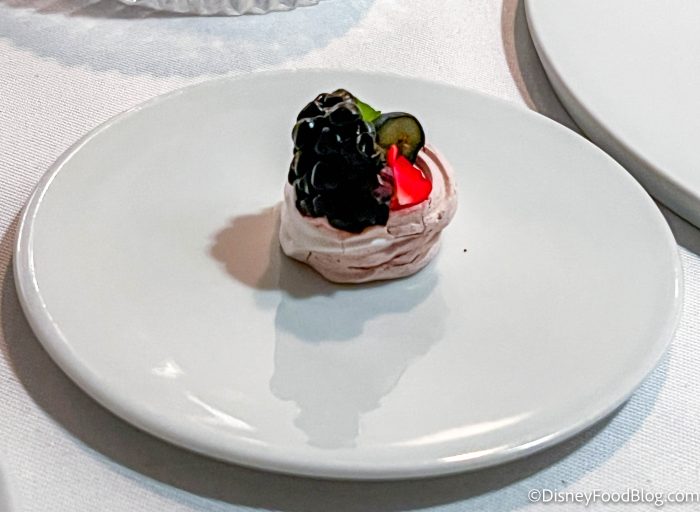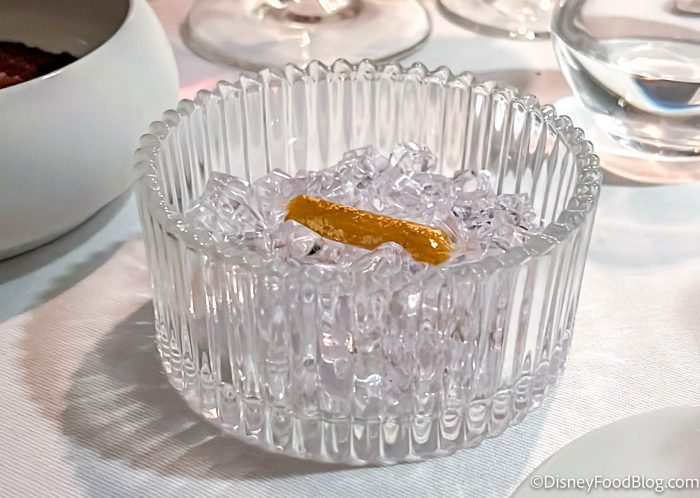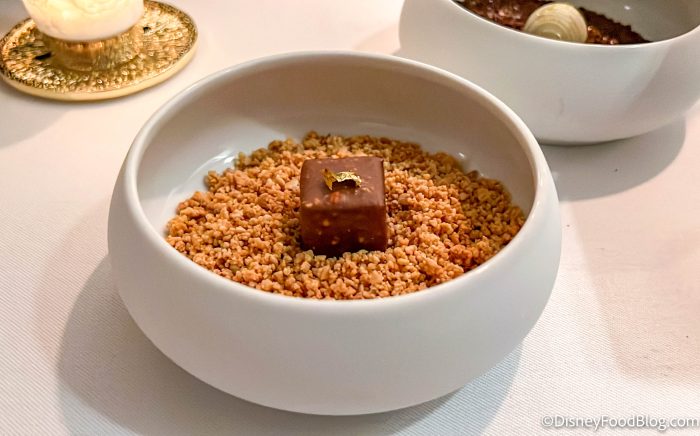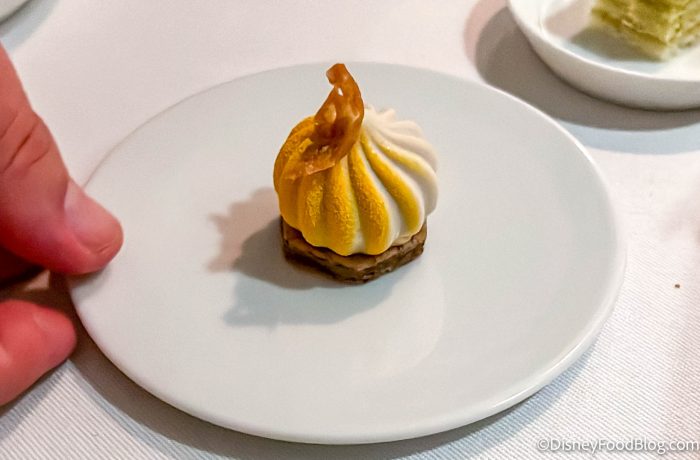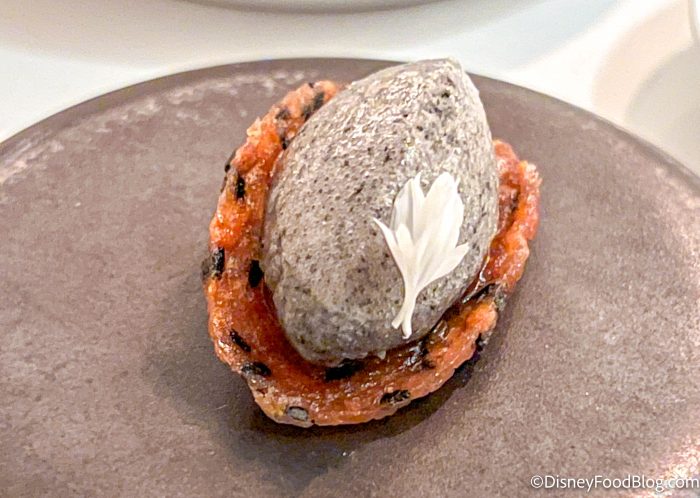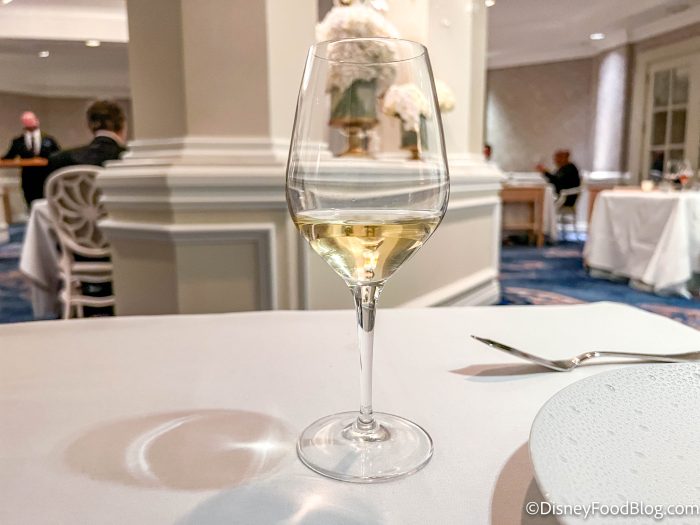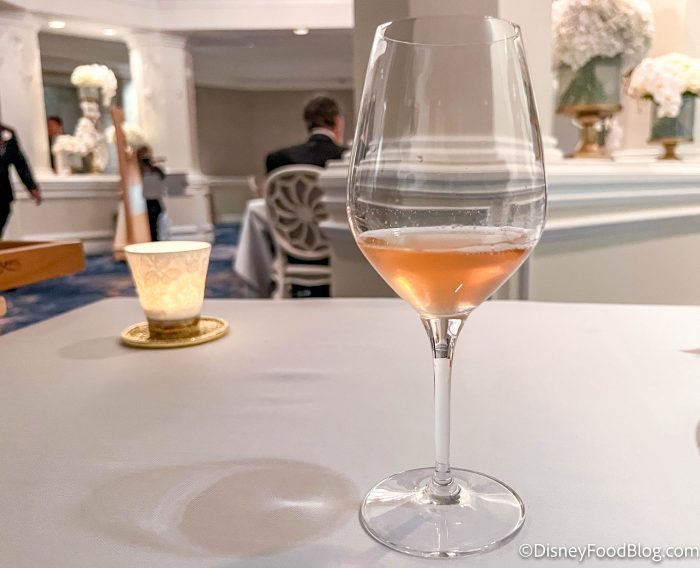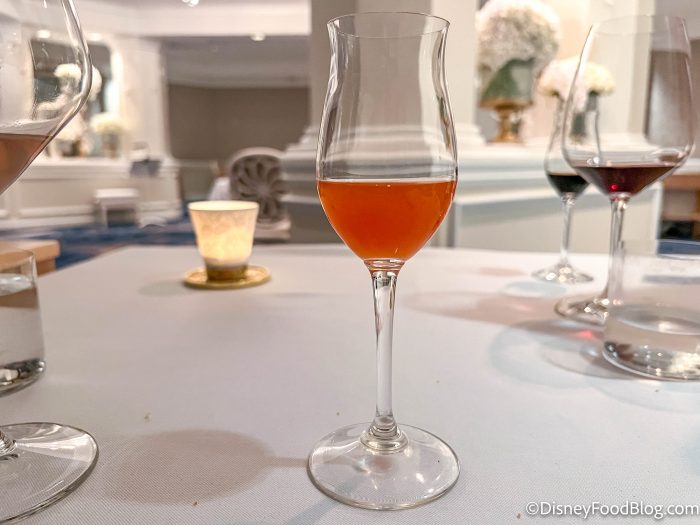Picture this: You’ve just finished a long day at Magic Kingdom. You’ve been surrounded by heat, sweat, long lines, and french fries. You’re craving something relaxing, something that’ll make you feel like you’ve completely escaped Disney World and entered the realm of pure luxury. We’re talking chandeliers, drinks paired perfectly to a multi-course meal, and food you probably can’t even pronounce…we’re talking, of course, about Disney World’s swankiest restaurant.
Pull out your fancy clothes. We’re talking you the fanciest ride of your life with a FULL review of what it’s like to eat at the nicest restaurant in all of Disney World — The Grand Floridian Resort & Spa’s Victoria & Albert’s.
Atmosphere & Experience
If you’ve never dined here, let’s go over a quick run-down. Victoria & Albert’s is truly THE place for the luxurious meal of your dreams. Dinner here is served via multiple courses over a few hours. The restaurant has actually received the AAA five-diamond rating, along with other accolades.
The menu changes often, reflecting the best of what is in season and available. There are OVER 500 wines available, an entire menu dedicated to WATER (what?! YES!), and much more. There are 3 main dining experiences to pick from.
The least expensive option is The Dining Room, which features the Chef’s Tasting Menu. There are wine or zero-proof pairings that can be obtained with the tasting menu. The prix-fixe meal starts at $295 per person. Optional wine pairings start at $150 per guest, while zero-proof pairings are $110 per person. (That doesn’t include tax or gratuity).
There’s also Queen Victoria’s room. This also features a Chef’s Tasting Menu, generally with MORE courses than those offered in The Dining Room. There are wine and zero-proof pairings available as well. This room is special because it accommodates no more than 8 guests per night, making things much more private.
Pricing for this starts at $375 per guest. Wine pairings start at $200 per guest, and zero-proof pairings start at $110 per guest.
Finally, for the ULTIMATE in luxury, you can book a reservation to be seated at the Chef’s Table. This is an ULTRA exclusive experience for 4-6 guests that lasts about 3 hours. Guests are again served a multi-course meal, but they get to sit right at the heart of the restaurant, with a view into the kitchen and the chefs. People dining here will get to interact with the team and really get an in-depth dining experience.
Pricing is $425 per person, with optional wine pairings starting at $200 per guest, and zero-proof pairing starting at $110 per guest.
For all of the experiences, a dress code is in effect. Disney notes that the restaurant is an “exquisite and intimate upscale dining experience” so guests are expected to “dress accordingly in semi-formal/formal attire that respects the restaurant’s elegant and opulent aesthetic.” In other words, leave the Crocs at home.
While a jacket used to be required, it is now “requested.” If a jacket is not possible, men are allowed to wear a button-down long-sleeved shirt. We saw some guests without a jacket during dinner. But generally, you’ll see a mix in terms of what people are wearing. Some will come in FULL formal gear (long dress and all), while others will come a bit more semi-formal. If you have any doubts about what to wear or what might be appropriate, don’t hesitate to reach out to Victoria & Albert’s team at 407-939-3862.
Also, keep in mind that there is an age requirement. All guests dining here must be 10 years old or above. Also, valet parking is included in the cost of your meal.
And finally, if you have any dietary needs, be sure to communicate that with the team when you book your reservation. The restaurant can accommodate most special dietary needs, but you’ll need to provide them with advance notice so they can prepare a menu that suits you.
You can book some reservations online (or by calling the number included above), but the Chef’s Table must be booked over the phone.
Okay, let’s get to our experience! For our meal, we were invited by Disney to attend as media in The Dining Room. We got to experience the extended nine-course menu that is served in Queen Victoria’s Room and the Chef’s Table. Note that this was a special arrangement made for us, but traditionally The Dining Room serves a 7-course meal.
The team may be able to provide this 9-course meal in The Dining Room for an upcharge, but there are no guarantees. If you’re interested in obtaining this or seeing if it’s available, be sure to ask at the time of booking.
Our dinner started with a walk over to the Dining Room with some drinks in tow.
The atmosphere is truly luxurious, from the chandeliers to the ornate decor on the ceiling and walls, to the flowers, the live harpist, and even just the table settings. Everything is exquisitely designed and you’ll really feel like you’ve left the theme parks of Disney World behind and entered the world where only the best of the best is served.
Menu
The menu comes in a beautiful envelope (of course), ready for you to open it up and discover the secrets inside. Keep in mind that the menu does change depending on the ingredients that are in season and other considerations, so what we were served may not always appear on the menu. The menu you may be offered for your trip may be dramatically different.
Two of our reporters dined at the experience together — one of which eats a plant-based diet and one who does not. Because of their different dietary needs, the menus were customized to them.
One (the plant-based menu) included courses with charred mushroom, one with heirloom beans, a carrot tikka masala, and much more.
The other had caviar, toothfish, green circle chicken, and a variety of other dishes.
Both were multi-course meals with drink options suggested to be paired with each.
The beverage program is shown on their digital menu and it is EXTENSIVE. Click on Prince Albert and you’ll get to check it out for yourself. We’re not joking folks, there are 46 PAGES of wine options to pick from. If you click on Her Majesty, you can look at the wine list via the Sommelier’s suggestions, flavor profiles, or varieties.
You can also look at the menu options there for tea, after-dinner drinks, cocktails, and water. Yes, there is a WATER menu. We’re telling you, this is the lap of luxury, even your water is fancy!
Victoria & Albert’s serves waters from around the world, so you could see what it’s like to sample some water from the United Kingdom, Italy, France, Germany, and more.
Now, let’s get to our food!
Eats
Amuse Bouche
Our meal started off with an Amuse Bouche course. This actually consisted of 3 separate little dishes. (For those who might be wondering, an Amuse Bouche is basically a fancy little bite-size options to start off your meal. Unlike appetizers, they’re usually free and picked by the Chef.)
First was the Pink Pineapple, which featured Thai basil and spiced mango. (This was on the plant-based and regular menus.) According to our server, the pink pineapple used is grown exclusively by the DOLE company in Costa Rica and is known for its pink flesh and sweetness with low acid and tart levels. The chef takes the pineapple and chars it on a single side at high heat and tops it with a spiced mango emulsion, Thai basil, and long grain puffed rice.
This was delightful! It was a very sweet bite of pineapple with a lovely crunch and sauce addition. One of our reporters shared that this might very well be the BEST piece of pineapple they’ve ever had in their entire life. It didn’t have that sharpness or sourness that a traditional piece of pineapple often has, which makes it really unique.
One of our reporters noted that the pineapple also felt less fibrous and almost tasted like a pineapple soda or like when you eat dried pineapple. The slightly more savory topping was also fantastic and really amplified the pineapple without overpowering it at all.
Next, for the non-plant-based reporter, was the Langoustine Tartlette with watermelon and finger limes. This was a chilled salad of New Zealand langoustine. Langoustines are a relative of lobsters, but are smaller than lobsters and are particularly special because of the sweet meat that you can find in their tails (Food Network).
This was our one reporter’s favorite item out of the amuse bouche options. It melted in their mouth and was wonderfully savory, with a touch of floral flavors and a slight peppery kick to it as well.
Finally, for our non-plant-based reporter, there was a Cinco Jotas Iberico with miso caramel and a tasty “eclair” (a savory pate a choux). There was also a potato and truffle element in the center. The Cinco Jotas Hamon Iberico is one of the highest grades of pork coming from the Iberian Peninsula.
The quality of the pork was evident here. It melted in our mouth and the pastry really brought the whole dish together. The inside of the eclair had a mustardy flavor, and when combined together it tasted like the fanciest pig in a blanket you could ever imagine. 
For our plant-based eater, their amuse bouche selections included a Panisse (a.k.a. chickpea fries), with a Shiso leaf (an herb with a bright taste that has a taste somewhat similar to mint or basil — Mashed.com) which had been crisped in a tempura-style, and was sitting on top of a plantain puree.
This one had some interesting flavors. It gave us sushi vibes, but almost with the flavors of an American breakfast (like that sausage and maple syrup combination you probably recognize all too well from your early mornings in Disney World — but elevated, of course). In terms of texture, it was light and crunchy thanks to that tempura-style crispiness.
The final dish for the plant-based amuse bouche course was Potato Glass with Radish and Celery. This featured ingredients from the Chef’s Garden (which we also saw used at BoardWalk Deli). They’re actually the most prolific produce farm on the eastern seaboard. This dish featured baby turnips and radish, and other items as well as an herb emulsion at the bottom of the dish. The potato glass chips are lightly flash fried and the starch is removed to create that clear look.
This was INCREDIBLE. The vegetables were delicious. Plus, the potato glass was fantastically fun. It was probably the most fun part of the meal for our plant-based eater. As our reporter put it, they were “delicious and futuristic and magical.”
The dip served with it (that herb emulsion) tasted like a delicious onion dip and combining that with the vegetables was wonderful.
First Course
Next, for the non-plant-based eaters, we got a dish that honors Chef Scott Hunnel with one of his famous creations, the Cauliflower Panna Cotta with Royal Belgian Caviar. (Chef Hunnel used to be the Chef at Victoria & Albert’s and is now the Chef de Cuisine for Disney World Resorts).
This was AMAZING. The panna cotta was an unbelievably smooth puree with a cheesy flavor, and the caviar added the slightest (but most delicious) level of saltiness.
The plant-based menu offered a beets dish as its first course. This was made of Beets, Plum Wine, and a Yuzu Meringue. The beets were from Chef’s Garden (a trend that continued throughout the night) and had been roasted and slightly pickled. They were resting in an aerated beet cloud foam with some plum wine and meringue made from yuzu.
This dish was sweet and savory, with a little bit of acidity mixed in, in the most perfect way (it was a sort of vinegar-style acidity). It was like eating a cloud of perfectly savory beet puree, with beets underneath.
We may have never known that we wanted to eat a beet cloud, but now we know, and we are forever thankful. 
Bread
Then it was bread time! The bread we got was an Epee Baguette. Honestly, this didn’t taste all that special, which was sort of a letdown. Don’t get us wrong, it was definitely good bread with an amazing quality to the crust, and a great mix of crunchiness and chewiness, but on its own, it wasn’t anything to write home about.
With the bread, we also got some butter that was incredibly creamy and delicious. If we weren’t in such a fancy restaurant, you might even catch us eating that butter straight off the plate on its own with a spoon — it was THAT good. The salt on the butter was chunky, but not overpowering. Mixed with the bread, the butter was a true delight.
For the plant-based menu, we got the bread with some olive oil on the side. The company that creates this olive oil actually takes 5 different olives (all grown in the south of France), ages them for 8 days (like raisins in the sun), and then cold presses them. The result is meant to be very fruit-forward, like biting into a black olive with notes of blueberry.
This appeared to be the same bread shape and Olive Oil used at Topolino’s Terrace. So, while good, it’s not anything particularly special to this exact restaurant.
Second Course
For the second course, the non-plant-based menu featured Danish Hiramasa (which is yellowtail kingfish), it’s cured with some citrus and yuzu, and plated with Carrot and Okinawan Potatoes.
WOWZA. This dish was incredible. The fish didn’t have an overly fishy taste to it at all. It was a beautiful white fish with complements of citrus. And the puree served with it was fantastic, with just a touch of heat.
For the plant-based menu, the second course consisted of Toybox Heirloom Tomatoes (lightly peeled) with Gazpacho and 100-year Balsamico (balsamic vinegar). Some of the tomatoes are raw and some are balsamic poached. The dish also features cucumber, tomato water, a dollop of sundried tomatoes, and droplets of house-made basil oil, as well as a little yellow tomato gazpacho.
In terms of the 100-year balsamico, it tasted like molasses and balsamic vinegar had a beautiful (and probably very expensive) baby. Our favorite detail of the night may have very well been just how delicately this balsamic was served. We literally just got DOTS (yes, little DROPLETS) of it for our dishes. But it changed our lives. 
In terms of the tomato dish itself, the tomato flavor was INTENSE. We really loved how all of the plant-based courses showcased the natural fierceness of produce that has been carefully grown. They truly shine all on their own because they are vegetables, not in spite of them being vegetables. It was the most tomato-forward dish in terms of taste that we’ve ever really had, combined with that cold tomato broth with basil drops.
Overall, the tomatoes gave off a sophisticated flavor that tasted very elevated. It’s the kind of flavor you won’t really find in a store or neighborhood cafe. Plus the basil drops had a great floral and acidity to them.
Third Course
The third course (non-plant-based menu) was the Wild Turbot with Fennel and Baby Leeks. Our server told us that this was often referred to as “the Emperor’s Fish” dating back to 1st and 2nd century AD and you can find it included in one story by a Roman poet.
The fish is lightly poached and served on top of the funnel puree with those baby leeks and some shallots. There’s also a sauce poured tableside (which is finished with fish fume) to compliment the dish.
This fish was fantastically buttery and overall just amazing (are you sensing a theme here?). We completely devoured it. And the sauce?! Don’t even get us started. You’re going to want to eat that up with a spoon, and we won’t judge you ’cause we did the same thing. The dish had just the right of spice to it, without being alienating to those who don’t really like heat.
For the plant-based menu, the third course consisted of Arrowhead Cabbage, “Pastrami,” and Rye Gnocchi. One of the sous chefs at Victoria & Albert’s is from New York and they worked on creating a plant-based version of some of the iconic food you’d see in the city that never sleeps — like that signature pastrami you might find at places like Katz’s Deli! The cabbage is prepared in a pastrami style, glazed with pastrami glaze, served on top of gnocchi, with a pumpernickel tweel and watermelon reddish that has been brined and shaved in a pastrami style.
In essence, it was meant to be a Reuben made of vegetables, and, truly, it unbelievably replicated the flavors of a pastrami sandwich. The mustard seeds represented the dark mustards associated with this New York classic, and the sauerkraut, rye, and pumpernickel were all represented in such unique ways. It was an incredible plate of vegetables made to taste meat-centric in the most fantastic way!
Note that these offerings were part of the extended 9-course meal traditionally offered at Queen Victoria’s Room.
More Bread
Then, it was time for more bread! For the regular menu, we were served a puff pastry combined with Plugra Butter, which is a European-style butter, though this one is made in the U.S. (it has 82% butter fat).
This was served with butter that had been toasted. The chefs then separate the milk solids and reconstitute them into a spreadable form, so it’s a truly spreadable brown butter.
For the plant-based option, we got a separate piece of bread that was thyme and garlic focaccia.
It was paired with Spanish olive oil.
Fourth Course
Our fourth course (non-plant-based menu) consisted of Glacier 51 Toothfish, Charred Mushroom, and Sambal. These dishes featured a variety of mushrooms, some with a light soy glaze, and some which had been pickled with a touch of rice wine vinegar, mirin, and sake. There were also daikon reddish cylinders, a mushroom gastrique, and other touches.
One of our servers described this dish as “seriously perfect,” and we’d have to agree. The mushrooms were wonderfully flavorful and the brown sauce paired with them had just a touch of heat. All of that was combined with the Toothfish, which had a great texture and lovely crisp exterior.
The plant-based course also had Charred Mushroom, but it was served with Bamboo Rice and Sambal. The brown sauce really captured those American Asian flavors of soy sauce and sugar.
The mushrooms ranged from small to large but were packed with some intense flavor. And there was a bit of heat to this dish that we enjoyed.
Overall, it was really delicious, and the packets of rice wrapped in the rice paper were a fun touch, and they were easy to pick up with our chopsticks and dip in the sauce.
Fifth Course
Our next non-plant-based course was chicken. This dish had Green Circle Chicken (an heirloom chicken sourced from France which is raised on a more natural diet without carbohydrates), Australian Black Truffle, and Corn. There’s also a touch of sweetness meant to be incorporated throughout.
The chicken was amazing, but really didn’t even hold a candle to the fish we had here. The main flavor we got was that truffle, and the chicken itself cut like butter (it was incredible). Overall, it was a great course, but we liked the others better.
For the plant-based menu option, we got a dish made with Huitlachoche (otherwise known as Mexican truffle, this is a fungus that feeds off of corn, according to Eater.com), Corn, and Australian Black Truffle.
During our first few bites, we mainly just tried the foam on top on its own and it was, in a word, FUNKY. When we got down to the pieces of tortellini and corn, however, that’s when the dish really came together and we grew to enjoy it.
We felt that the Huitlachoche and corn really complimented each other well, which makes sense since they sort of grow together!
Sixth Course
This course featured Lamb, Pickled Blueberries, and Violet Mustard. One version of the lamb included was essentially the t-bone of the lamb (a combination of strip loin and tenderloin, wrapped in the fat cap). The collar of the lamb was also served, which is meant to be some of the most tender meat. It was braised and topped with a blueberry element. Tying the dish together was that violet mustard.
Our reporter who tried this fully admitted that they don’t love lamb, but they thought this was SO good. The t-bone portion was a bit hard to cut through, but it was still a very good cut of lamb wrapped in the fat. The one with the berry on top (that lamb collar) was our favorite. It had a sort of fancy pulled pork texture to it. And the last bit was packed with that char flavor and it went well with the greens on the plate.
Our plant-based option for this course had Heirloom Beans, Potato, and Turnips. There were cranberry and tarwi beans, potato bulbs that have been lightly smoked, and a crispy layer on the top (with that lattice of potato). There were also zucchinis, turnips, and more items.
The little crown on the top of this dish was very awkward to break (even with a knife!). The easiest thing would’ve been to pick it up, and eat it, but of course at a place like Victoria & Albert’s, you just can’t! You gotta keep up appearances folks!
Our reporter who tried this shared that they love beans, but they felt like this dish felt a little out of place and not quite as elevated as they would have expected from Victoria & Albert’s.
Ultimately, this dish ended up being the least memorable plant-based item for them. The flavors just weren’t quite as dazzling as some of the other ones were. But the variety of the beans were nice.
Breads…AGAIN
Yes, it’s time for MORE bread folks, and we ain’t mad. This was meant to be an Austrian bread that is used often to welcome individuals into their house.
For the non-plant-based menu, we were also served some ribboned butter.
This was our least favorite of the pieces of bread served, as it was VERY dense. Now, don’t get us wrong — the bread still had great flavor and it was evident that it was of high quality, but it was just very dense and a bit dry. One reporter shared that they really had to dip it in olive oil to help with how dry it was.
The ribboned butter was similar to another butter we were served (as it did use the same base), and was pretty good. The moral of the story here? Don’t fill up on the bread here — you’ll want room in your stomach for the other stuff!
Seventh Course
For the non-plant-based menu, the seventh course consisted of Miyazaki A-5 (A-5 being the highest classification of beef from Japan), Potato Rosti (swiss potato cake), and Romesco. It was prepared in a tataki style.
This course was SO rich. The meat was beautifully tender and flavorful but was also incredibly fatty and rich. After eating so many courses, we honestly found it to be almost too rich to eat. But if you love beef, we think you’ll really appreciate this one.
The Rosti was wonderful, but also so rich and flavorful that it was almost overwhelming. The pepper sauces and pepper on the Rosti did a good job of balancing out the dish. That acidity was much needed to cut through some of the richer ingredients.
For the plant-based menu, there was Carrot Tikka Masala, Cilantro, and Puri. There were carrots and carrot tops, tikka sauce, and carrot top chutney finished with coriander. The Puri breads were served on the side — they’re crispy half-moon breads for dipping.
This dish had some incredible Indian flavors with all of the carrots, though we have to say that the crunchy fried shoestring carrots on top were our favorite, along with the spiced pieces of bread that came with the dish. It almost gave us spiced potato hand pie vibes, but with carrot as the star and without the pie part!
The spiced breads were little Puri breads seasoned with coffee, coriander, and spices. We didn’t taste the coffee, but that was fine by us. These were presented as an option to use to soak up that sauce, but we found they were a little too crisp and hollow to really sop up the sauce, so we mainly used them as companion bites to the main dish.
Note that these offerings were part of the extended 9-course meal traditionally offered at Queen Victoria’s Room.
Cheese
Next, it was time for cheese, of course! These were inspired by one of the chef’s time spent on a reindeer farm. Both featured plums (fresh, preserved with black olive soil, and fermented), aerated caramel candy that looks like a honeycomb and is reminiscent of the bees that were on the chef’s farm, and then the cheese (or “cheese” in the plant-based one) topped with a tapioca rice cracker.
The non-plant-based cheese was a double cream cheese made in a brie style. The goal in creating this cheese was to make the rind almost indistinguishable from the cheese.
This really was an amazing cheese board and we found that it was best when you got a little bite of everything mixed together. The cheese was so soft and oozy (in the best way possible). And we especially loved the sweetness added by the caramel candy.
For the plant-based “cheese” board, they used cashew cream with lemon zest and a hint of thyme. The fruit was really delicious here, but the cheese had an overwhelming coconut flavor that our reporter didn’t really love.
Our reporter shared that they wished it had been more cashew-based in flavor because those can sometimes be more similar to traditional dairy cheeses. But the texture of these more coconut-y cheeses was good, and our reporter did fully disclose that they ate them ALL. So it wasn’t all bad. 
Dessert
Finally, we got to dessert, the FINAL course of the night! This consisted of a variety of items.
First, there was a Honey Elderflower Ice Cream with a raspberry sauce on top. Our reporter who tried this doesn’t love raspberry so that wasn’t their favorite element of the dish, but the actual ice cream part was delicious and so wonderfully light after such an extensive meal.
Next was the Warm Chocolate Cookie with warm chocolate ganache. This was on the crunchy side, so keep that in mind. Our reporter who had this doesn’t love chocolate, so this wasn’t their favorite, but it was nice when combined with a bit of the raspberry from the ice cream!
Then we had the Spectrum of Chocolate. This is made of a chocolate biscuit base, dark chocolate ganache, milk chocolate mousse, golden chocolate custard, a white chocolate component, and vanilla buttercream center, finished with a chocolate and Grand Marnier mix.
This was GORGEOUS. Even as a non-chocolate person, our reporter still felt like it was amazing. Because of the many different kinds of chocolates utilized in the dish, it didn’t feel overwhelmingly rich. The inside was also divine — think of it like a giant (extra fancy) Lindor truffle.
There was also a Pistachio Petit Four, which is made with layers of lemon chiffon cake with pistachio ganache and pistachio marzipan. This was really good. Our reporter who had this loves pistachio, so they actually wished that it had a stronger pistachio flavor, but it was still good and the way it was created made it feel like it had a million layers. FANCY. (Y’all better put your pinkies up when eating this!)
Then there was the Praline Truffle, which is a house bonbon robed in white chocolate dipped in a little 23 gold carrot leaf (because WHY NOT?!). This was good and sweet. It mostly tasted like a creamy praline truffle. While good, it wasn’t the most memorable of the desserts.
Then we dug into the Pavlova, a strawberry mix of merengue with lemon curd in the center topped with fresh berries. THIS IS IT FRIENDS. THIS was the winner (on the non-plant-based menu). The texture of a pavlova (that meringue texture) can be offputting to some, but it was so fruity and so tasty that we think it’ll win you over. We’ll take a million of these, please!
Finally, we have the Tropical Caramel, which had flavors of banana, passion fruit, and guava — and everything (including the wrapper) is edible!
While this wasn’t our favorite dessert to eat, it was probably the most interesting and “coolest” of the desserts. It was heavy on the tropical flavors, especially the passion fruit. It was more of a chewy caramel, which was nice. But the really exciting part of this dish was the fact that the wrapper was edible!
The plant-based dessert menu started with a little plant-based ice cream dish with a Passionfruit curd at the bottom with haupia (a traditional Hawaiian dessert using coconut and coconut milk).
There was also shaved ice with fresh dragon fruit.
There was also a Warm Peach Raspberry Cookie.
Then we get to one of the stars of the plant-based dessert course — the Praline Temple! This has a dark chocolate base, layers of praline ganache and merengue, surrounded by shards of white chocolate infused with crispy rice, and is finished with a sauce.
The praline temple was DELICIOUS and so incredibly rich we were amazed at the fact that it was plant-based. Around the sides, it was like praline brittle and it was just like eating candy. There was a little chocolate cake inside that was wonderfully moist and the mousse was really surprising. We really thought we had been served a non-plant-based dessert at first.
There was also a Rhubarb Pie (cherry rhubarb tartlet)…
…Sticky Toffee Pudding…
…Banana Gateau (meant to be a nod to the banana cheesecake with graham base)…
…and Tahini Mousse (black sesame tahini mousse and black sesame seed cracker).
Out of these, the Sticky Toffee Pudding and Banana Gateau were some big standouts — we wouldn’t mind filling ourselves up on those again and again!
Drinks
The drinks are all meant to compliment the dishes. While there are plenty of alcoholic drinks to choose from here, there are also zero alcohol options as well, so don’t let the idea of pairing a drink with your meal be quashed by the fact that you don’t drink alcohol!
First Course Drinks
For the alcohol drinkers, you may opt to start out with a Champagne that features fruity notes of white peach and tart raspberry with fine bubbles that can create a creamy, indulgent texture. This was SO light and drinkable. It had a great fruity note on the front end and then a nice acidic finish. Overall, it was very clean and paired perfectly with the Cauliflower Panna Cotta.
The first zero alcohol drink we got was a Yuzu Seltzer. It featured sparkling water inflused with yuzu juice and fresh lemon zest, and some rosemary and jasmine.
This drink was light and citrusy, almost as if grapefruit and tangerine had a lovely baby. And the effervescence of it was really nice!
Second Course Drinks
For the alcohol drinkers, we got wine, specifically a Riesling. This was described as “late harvest,” meaning that the grapes get to stay on the vine extra long which gives them an extra level of sweetness. It was almost as sweet as a Moscato, but had far more robust flavors.
For the zero alcohol drinkers, we grabbed a drink with Tomatillo and Melon. This had a bright green flavor (herb-forward), balanced with fresh lime and melon.
This drink was interesting. It tasted like melon, but had that hint of earthiness to it. It wasn’t our favorite non-alcoholic drink of the night, but we will say that it gave off that fancy and expensive feeling, so there’s that!
Third Course Drinks
For the third course, our alcoholic drink was a Chardonnay. It’s 100% chardonnay using entirely stainless steel. This was a really good, very crisp chardonnay.
The non-alcoholic drink for this course was a Vin de Peche. They got an unfermented white wine and added some essence of lemon and macerated peach that had been stewed to extract as much flavor out of it as possible.
This was incredibly nice and refreshing. And we know what you might be thinking, non-fermented wine is basically just grape juice. And yes, you’re right. But hey, this is a fancy meal so we’re calling conventional things by fancy names — those are the rules!  To describe the flavor we’d say this — think of the BEST cold-pressed white grape juice you will ever have in your life, and picture that blended with a burst of peach flavor. Our reporter was basically BEGGING for this to become part of their daily dinners because it’s just that good!
To describe the flavor we’d say this — think of the BEST cold-pressed white grape juice you will ever have in your life, and picture that blended with a burst of peach flavor. Our reporter was basically BEGGING for this to become part of their daily dinners because it’s just that good!
Fourth Course Drink
Our fourth-course alcoholic drink was a Pinot Noir and our reporter said it was probably the best Pinot Noir they’ve ever tasted. The flavor was robust but it was still easy to drink and it paired amazingly with the fish.
Our fourth-course non-alcoholic drink featured a Lychee and Basmati Rice blend. They steep the basmati rice until it’s almost a tea, then they add red fruits, lemongrass, a little fresh lychee, and lime, and then pump in nitrogen to draw out the flavors.
The way the rice is incorporated into this drink made it almost creamy and cloudy, but also oh-so-delicious. Our reporter who tried this is a huge lychee fan, and the drink did NOT disappoint. It was very unique, but not offputting or strange in any way. Just a solid lychee drink!
Fifth Course Drink
For our fifth course, we were served a wine (the Vigneti Del Salento ‘Leggenda’ Primitivo di Manduria). Our server shared that it is a wine that is meant to be very rich with a subtle structure. This was a wine with a VERY big flavor. When paired with the chicken, it actually got quite peppery.
The fifth-course non-alcoholic drink was a Guajillo Spice. The drink is made with dehydrated guajillo peppers, charred jalapenos, and some other ingredients. They really try to capture the smokiness of these items, but balance it out with some fresh lime.
It was an unbelievable virgin dupe for whiskey. We couldn’t even finish it because it was almost too real, too rich, and too sweet for us. It’s the one drink of the night our reporter said they wouldn’t order again, but we absolutely LOVE that it’s an option for someone looking for something like that.
Sixth Course Drink
Our next drink (alcoholic) was another wine (Massaya ‘Gold Reserve’) which is meant to have a robust, fruit-forward flavor. This wine paired really well with the lamb and had a BIG flavor.
The non-alcoholic drink for this course was a Cassis. It was meant to almost capture the flavors of a classic glass of Bourdeaux wine. It’s meant to have those dark cherry and raspberry flavors, and they’ve added in vanilla as well as some other elements.
To us, this was almost like a fruit syrup or cordial in terms of consistency. The serving was small and perfect. Any more of this and it would have totally ruined dessert!
Seventh Course Drink
We also got an alcoholic drink for our seventh course, which was a Domaine de la Solitude. This tends to be more herbal and more mineral-driven.
Our non-alcoholic drink for the seventh course was a “milk punch.”
A real version of this drink would use milk to help filtrate it, but to keep it plant-based they used coconut milk to filtrate it.
Cheese Course Drinks
The alcoholic drink was a Nickel & Nickel ‘Dolce,’ Napa.
The non-alcoholic drink was a “Sauternes.”
But wait…there’s one more drink to explore!
Coffee
The coffee served here is roasted and ground specifically for them by Joffrey’s Coffee. It’s presented in a reverse siphon where warm water is placed in the bottom bowl.
As they heat the burner, the steam rises into the top container with the coffee grounds. The coffee will steep for 3-4 minutes (depending on how you like it), and there’s a filter at the middle level. As the heat is removed, the water falls back into the container and the grounds will remain on the top level.
And THAT’S IT. WE MADE IT FRIENDS. If you read to the end of this post, drop us a comment, give yourself a pat on the back, go take 5 — it’s been a lot. Well, actually, don’t take 5 just yet — we’ve got some more things to discuss.
Nosh or Not
While we were able to eat at Victoria & Albert’s through a media event, we have paid for meals here in the past and we’ve got some thoughts on whether the cost might be worth it for you.
Shell our $300+ on a meal at Victoria & Albert’s if:
- You want to experience the BEST Disney World has to offer — Will you eat at Victoria & Albert’s every time you go to Disney World? Maybe not. Will it end up being a once-in-a-lifetime-type meal? Maybe. But if you’re looking to really experience the finest food and service Disney has to offer, this is it.
- You love multi-course meals — This meal had allllllll the courses. Granted, we got to experience the 9-course meal from Queen Victoria’s Room, but still, even 7 courses would have been a lot. If you’re all about trying a bunch of different things, rather than just having 1 big entree, then this might work well for you.
- You are celebrating a special occasion — If you’ve got a family member or friend who just celebrated a big achievement or you’re looking for a romantic getaway for you and your partner, this is a great place to go, especially if you go for the more intimate Queen Victoria’s room.
SKIP Victoria & Albert’s if:
- You aren’t looking to spend all the big bucks — This restaurant’s price tag is no joke, and the base prices listed above don’t even include tax and tip. If you sort of want a fine dining experience but don’t want to shell out $300+ per person, this is a skip. We’d recommend one of Disney’s other signature dining experiences instead, like California Grill, where you can still have a fancy meal but keep the price significantly lower.
- You aren’t into fine dining — This is a no-brainer, but if you’d rather eat chicken tenders and fries all day long, then the experience here probably won’t appeal to you. While we think it’s one of those Disney bucket list items and it might appeal to other people, don’t go simply because you feel like you’ve “got to.”
- You prefer to eat 1 singular LARGE dish — This is really all about courses. Each course is fairly small, but after eating all of them (plus the drink pairings, if you choose to get those), you’ll likely feel quite full. But if you’re someone who prefers to have a small appetizer, a single, large entree, and then maybe a small dessert, this might not fit your style.
Overall
Overall, Victoria & Albert’s, to us, is one of those once-in-a-lifetime, Disney bucket-list experiences. The food is high quality, as you’d expect. The service is top-notch. The location is beautiful and elegant. They can customize your menu to fit your dietary needs. And, oh yeah, most of the dishes we had were absolutely DELICIOUS. It checks all the boxes off in that department.
But it also comes with a tremendously large price tag. For the amount of money you’d spend on a single dinner here for one person, you could buy a park ticket for an extra day, or two, or maybe even close to 3 depending on when you visit. A dinner here could mean the difference between staying at a deluxe hotel or a value. That money could be used on snacks, or even just a better flight.
What’s truly worth the cash? That’s a question only you can answer. But if you’re looking for the fanciest, most elaborately elegant restaurant in Disney World, you know where to go.
Click here for our full page ALL about Victoria & Albert’s
Need Disney Restaurant Advice? We’ve Got EVERYTHING You Need to Know
-
See Our Complete Disney World Restaurants Guide
-
Check Out the 19 Best Restaurants in Disney World in 2022
-
Our Top 50 All-Time Best Disney Dining Tips
-
These Are the BEST Meals in Disney World for Under $15
-
Ranking Every Single Magic Kingdom Restaurant
-
Ranking Every Single EPCOT Restaurant
-
Ranking Every Single Restaurant in Disney’s Hollywood Studios
-
Ranking Every Single Restaurant in Disney’s Animal Kingdom
-
Ranking Every Single Restaurant in Disney Springs
-
Ranking Every Single Restaurant in Disney World Hotels – Cheap Eats Edition
-
Check Out Dozens of Disney Dining Tips and Tools
-
Learn All About Tipping at Disney Restaurants
Join the DFB Newsletter to get all the latest Disney food news right in your inbox! Click here to Subscribe!
Have you ever eaten at Victoria & Albert’s? Do you think it’s worth it? Tell us in the comments!
Disclosure: In nearly all circumstances, Disney Food Blog writers and photographers pay full price for their own travel, hotel, food, beverage, and event tickets. We do this because it’s important to us as journalists to ensure not only that we give you unbiased opinions, but also that you can trust us to do so since we’re paying our own way. On rare occasions, when we are invited by a company to attend a preview as media, and when we choose to accept that invitation, we will always make you, our readers, aware of that situation. We were invited by Disney World to attend a dinner at Victoria & Albert’s as a media guest. Note that when we attend events as media we are 1) Not required to review that event/food on any of our channels, and 2) Not required to review that event/food favorably. You can always count on DFB to give you a 100% unbiased and honest review of any event that we attend, food that we eat, or beverage that we drink. You can see more in our Disclosure Policy. Thank you for reading. — AJ
The post Join Us For a Meal at Disney World’s Most EXTRAVAGANT Restaurant — Victoria & Albert’s first appeared on the disney food blog.

